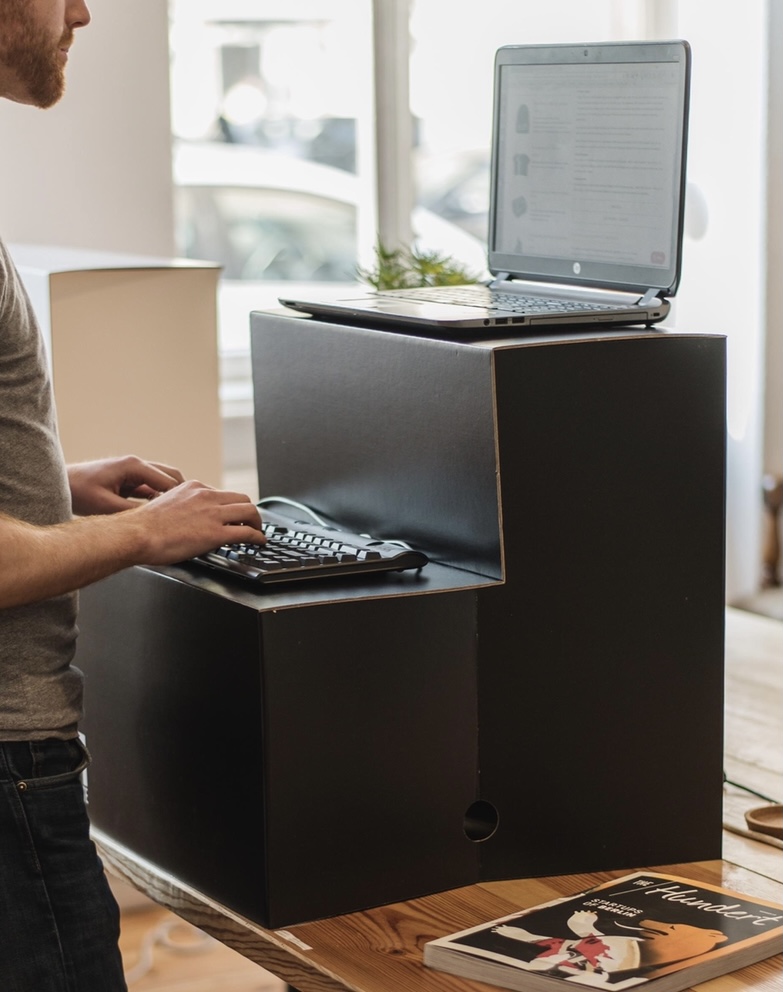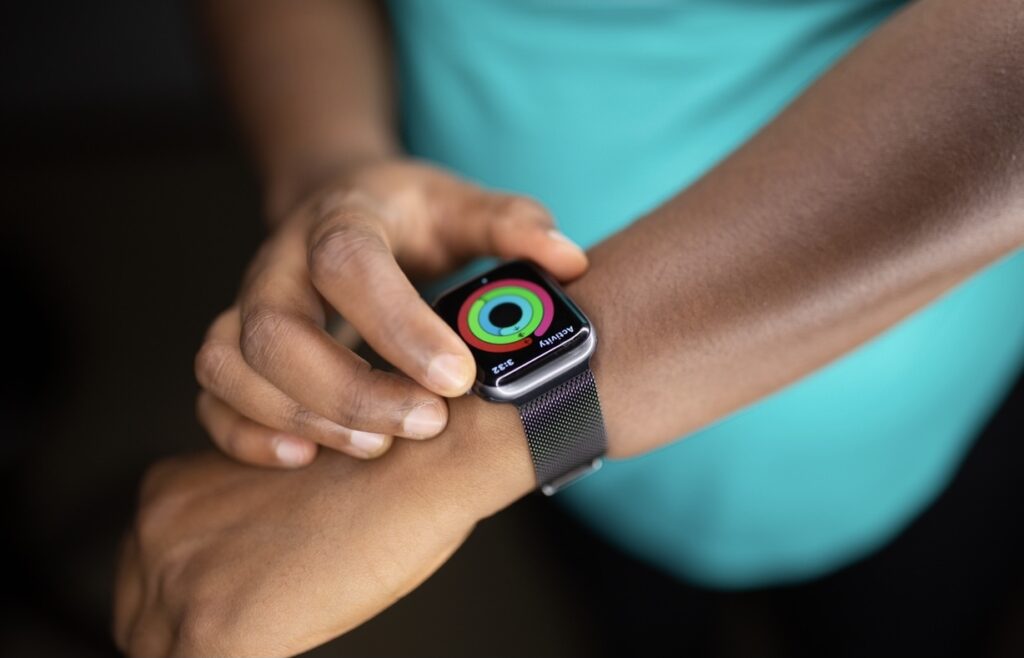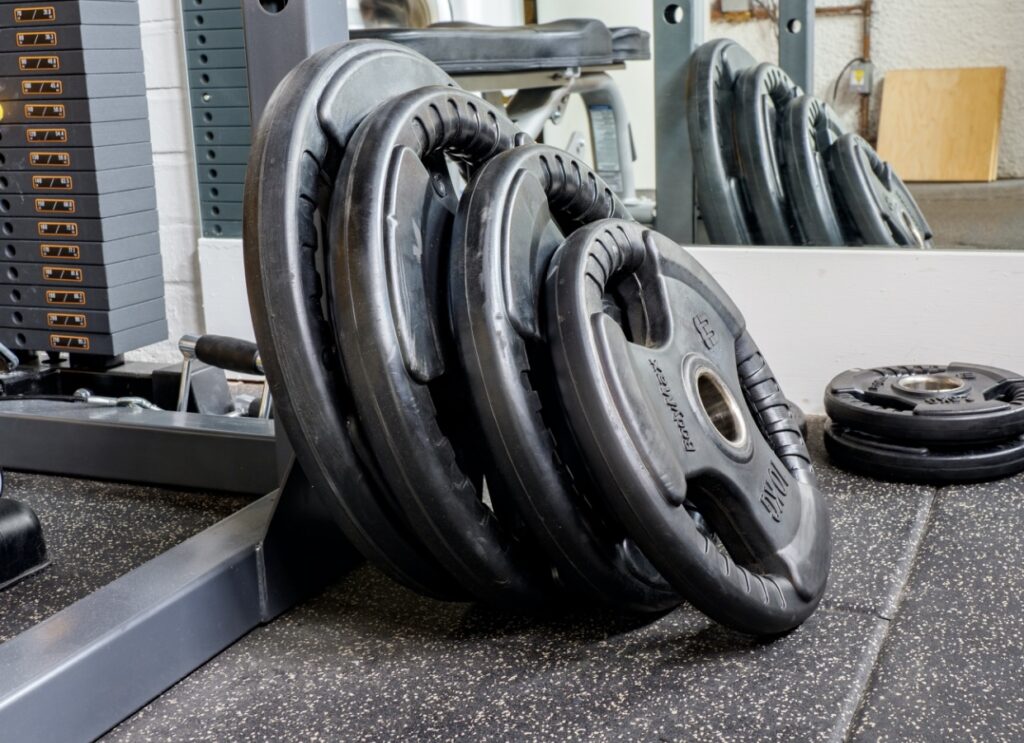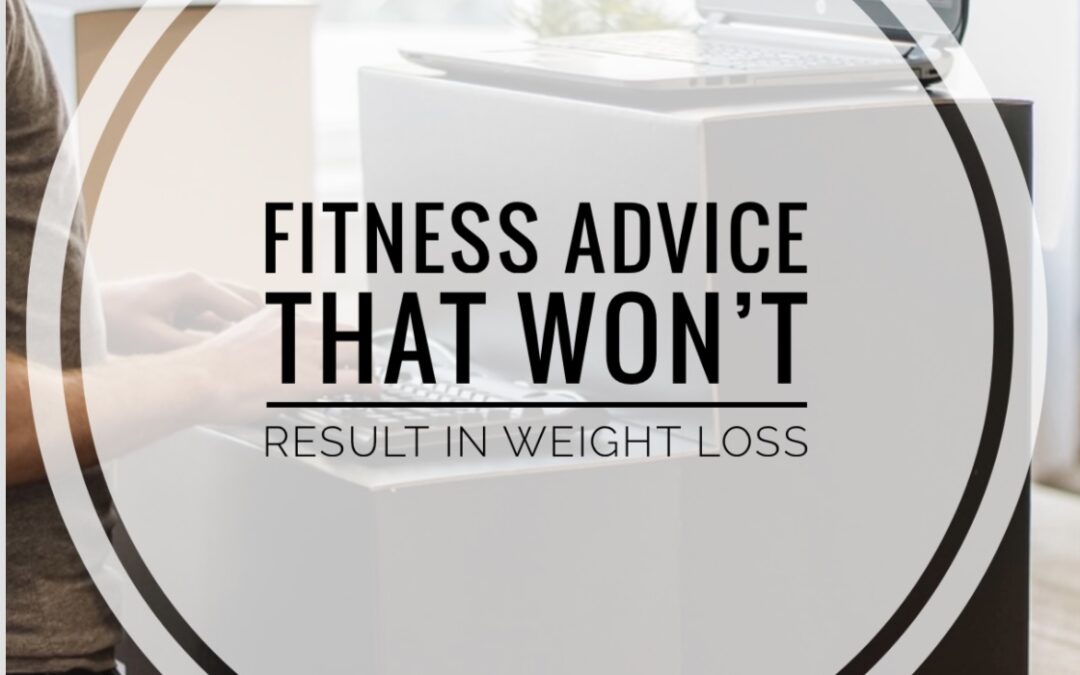You use a standing desk, track your steps, strength train and never leave home without your fitness tracker – but you’re not losing weight. You might be expending less energy than you realize. Here is some common fitness advice that won’t result in weight loss

You have a goal– weight loss! You’re motivated and ready to make changes. You bought a fitness tracker and you’re getting the recommended 10,000 steps a day. Strength training has been added to your workout regimen three days a week. And, you traded in your chair for a standing desk.
Two week later, you hop on the scale. You haven’t lost a pound.
No wonder you’re confused, upset and discouraged. If you’re wondering what you’re are you doing wrong, it’s not you. It’s advertising, advise and information that was over-simplified, misleading or misunderstood. It’s fitness advice that may be beneficial, but not necessarily for weight loss.
Weight Loss Versus Weight Maintenance – There’s A Difference
As a wellness expert, I do my best to stay up-to-date on the latest research. Last month, I attended a fantastic conference in Toronto. I was joined by some of the top fitness and nutrition communicators in the country. There is so much to be learned from sitting in a room full of experts, sharing and discussing our different areas of expertise, knowledge and views.
One of my absolute favorite presentations was by James Hill, PhD, a leading expert in the field of obesity research. Dr. Hill directs the nutrition obesity research center at the University of Alabama at Birmingham and is a highly regarded researcher in our field. His presentation discussed the differences between weight loss and weight maintenance. It highlighted the fact that, they are not the same thing, and they require different strategies to be accomplished.
My insides were bursting as I listened to him speak. I wanted to shout out YES with every sentence that he spoke. He remined the audience that, for many people, weight loss is very important. It’s not the number on the scale or being thin. The true benefit of losing weight is the feelings that accompany it. It’s feeling a sense of accomplishment and pride with reaching a goal. The physical changes can improve confidence, and the physiological changes can result in feeling more energetic. Many people report feeling like themselves again.
The feeling of accomplishment when reaching any goal – whether it be weight, wealthy, health or work related – can be life-changing. So, imagine how devastating it can feel to make positive changes, and have no success. It happens so often. Many times, it’s due to poor advice, misinformation or misinterpretation of what was communicated.
Mixed And Confusing Media Messages
Messages about food, nutrition and fitness get over-stated or misunderstood on a daily basis. The news sensationalizes headlines to get their story read. Companies create expensive marketing campaigns that get you to buy. Then, the misinformation spreads on social media in minutes.
I’m not blaming anyone. Business is business. This over-simplified and misleading information even happens among wellness experts. Someone get excited over learning new knowledge, then shares it, or gives a recommendation without understanding the whole picture. It happens – a lot!
In my food, fitness and nutrition world, I see it every day. There’s a lot of confusion over how exercise and activity can impact weight loss versus weight maintenance. I see consumers changing their habits for the better, but when those better habits don’t result in weight loss, they are disappointed. I would be disappointed, too.That’s why I’m writing this post today. These four recommendations might be beneficial some ways, but weight loss isn’t one of them.

Switch To A Standing Desk
Standing desks – do you use one? A standing desk allow you to stand while working at your “desk job.” They are a huge trend right now. There are some benefits to using these desks, especially for individuals who struggle to concentrate when sitting, or those with back pain. Some employees, however, are choosing to use one for the wrong reason. They believe standing will expend more energy and help them lose weight. If this is you, I’ve got some bad news. The difference in energy expenditure while sitting versus standing isn’t as much as you might think.
A systematic review and meta-analysis, published in the European Journal of Preventative Cardiology, analyzed 46 studies to determine the mean difference in energy expenditure between sitting and standing. The results suggest that by substituting sitting with standing for 6 hours/day, a 143 pound person would expend an additional 54 kcal/day. Another study, not included in the meta-analysis, fitted 74 healthy adults with masks that measured oxygen consumption to show calories burned. The results of that study showed that subjects burned ~80 calories/hour while sitting, and ~88 calories/hour while standing. That means you burn 8 more calories per hour by standing. That’s less calories than a breath mint.
No doubt, a sedentary lifestyle can contribute to weight gain, but, trading in your chair for a standing desk isn’t the answer. There might be good reasons to use a standing desk, but weight loss isn’t one of them.

Get 10,000 Steps Per Day
Do you have your tracker set for 10,000 steps? I’ve got news for you – there’s nothing scientific or magical about getting 10,000 steps a day. Even if you get 20,000 steps a day, you’re not guaranteed a weight loss. There are a few reasons for this. For one, not all steps are created equal. Getting 4,000 steps by walking around your house is not the same as getting 4,000 steps by jogging around your hilly neighborhood. Intensity matters. Getting over 30 minutes of moderate intensity exercise, while in your fat burning zone, is more likely to burn body fat than an hour walk around your house.
Intensity or not, if someone advised you to track your steps, it wasn’t bad fitness advice. Setting a daily steps goal is highly beneficial for the right person. Goal setting is good. And, getting 10,000 steps has health benefits worth walking for. If you’ve previously lost weight, being physically active can help you maintain that weight loss. Just don’t expect to lose lots of weight from walking. Instead, put more focus on what you eat each day.
Track Calories in, Calories Out On A Fitness Tracker
This piece of fitness advice is very common. Fitness trackers are so popular that it’s near impossible to find someone who hasn’t heard of them. I have one, and I love it. They’re a great way to hold yourself accountable. Many devices will even send alerts if you’ve been sitting too long, reminding you to get up and move. That’s especially helpful for workaholic’s like me, that can easily lose track of time when writing.
There can be a downside to tracking numbers though, especially if you’re the type of person who likes all your checks and balances to be spot on.
Imagine this scenario:
You purchase a new tracker and set it up with your age, height and weight so it can estimate your daily calories needs. Then, you set your goal weight. The tracker will estimate how many calories you should take in, and how much activity you should do in order to lose a pound a week. You’re sure to get the exact number of steps that it suggests. At the end of the day, you’re spot on with the recommendations. The tracker sends you a positive message and reinforcement – a beautiful graph showing your calorie deficit. You hit your goal. You proudly do this every day. Then, at the end of the week, you weigh yourself. No weight loss.You feel confused, angry and discouraged.
I don’t do much one on one weight loss counseling anymore, but I’ve seen this scenario so many times. I’ve actually had to tell clients to stop tracking do to their disappointment. Fitness trackers can be a useful tool, but it should never be used to track calories burned through exercise. When it comes to weight loss, what you eat should your number one priority. There is a long list of reasons to increase activity, but burning more calories isn’t one of them.

Add Strength Training to Increase Metabolic Rate
This might be one of the biggest misconceptions out there. It’s true muscle is more active than adipose tissue (fat), but sorry to say, adding a few days of strength training is not going to help you burn more body fat. The biggest predictor of metabolism is genetics, then comes age, sex, and organ size. In fact, a study published in PLOS ONE found that 43% of the differences between people’s metabolic rates can be explained by their organ size. You can change a lot about yourself, but you can’t change your genetic makeup, your age or your organs.
Don’t get me wrong, I encourage everyone to add strength training to their weekly regimen. It’s especially important to help maintain muscle mass as you age. Just don’t expect to see a drop in your waist line from adding a few days of strength training alone. Good fitness advice, but not good weight loss advice.
Bottomline
I want to be clear – walking 10,000 steps, standing in place of sitting, including weight training as part of you exercise program and using a fitness tracker can all beneficial. It’s not bad fitness advice. I’ve recommended each of these at one time or another. They can all help maintain a healthy weight, and help prevent re-gaining weight that you have already lost. But, it’s not fitness advice that will help you lose weight.
If weight loss is your goal, focus more attention on your what you eat than your exercise or activity. My post on creating a balanced meal plan can help get you started. And, if you need some new exercise ideas to get you moving, check out these fun fitness activities to re-ignite your motivation.


 Hi, I’m Heather – a registered dietitian, busy mom, consultant, adventure junkie and travel addict who has mastered living healthy on the go. My blog is where I share simple recipes and healthy living tips to help and inspire others to live their best life.
Hi, I’m Heather – a registered dietitian, busy mom, consultant, adventure junkie and travel addict who has mastered living healthy on the go. My blog is where I share simple recipes and healthy living tips to help and inspire others to live their best life.
Thank you for this post. I have a desk job and have been considering a standing desk as a way increase my activity. I guess it’s not as helpful for weight loss as I thought.
I really wish they would put in standing desk at my work.
Great advice! I think a lot of people who want to lose weight focus on hitting the gym really hard, and don’t know that incorporating manageable daily changes like standing more and simply getting more steps, over time, can make an impact.
I think many individuals who need to get in shape center around hitting the exercise center extremely hard and don’t have the foggiest idea about that joining reasonable every day changes like standing more and essentially getting more strides, after some time, can have an effect. I get it’s not as supportive for weight reduction as I suspected.
Hi Heather,
I think you are right on. I have about 20-30 lbs to lose. My workplace started a step challenge, I have been achieving 10k steps a day, eating habits the same, I feel that I have even gained a lb or two. So moral of the story is that I would need to modify my diet to see a weightloss.
Found so much value from your post! Thank you!!